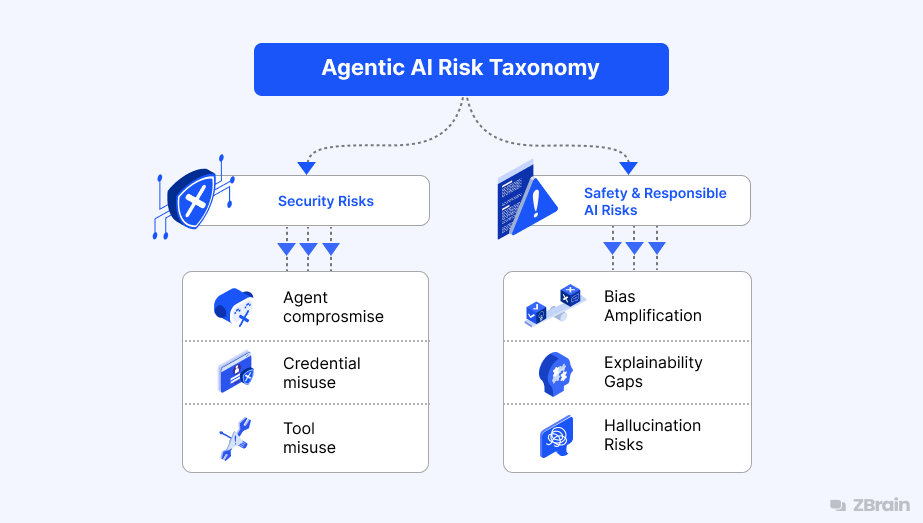Building Resilient AI Systems: Transforming Enterprise Operations

In today’s fast-paced digital landscape, enterprises are increasingly adopting AI to drive operational efficiency, enhance decision-making, and deliver personalized experiences. However, implementing AI effectively requires more than just deploying models—it demands a robust framework for building resilient AI agents that can operate reliably in complex, real-world environments. Platforms like ZBrain are redefining how organizations architect AI systems that are scalable, adaptable, and secure.
Understanding Resilient AI Agents
What Are Resilient AI Agents?
Resilient AI agents are intelligent systems designed to maintain performance and reliability despite changing data, operational disruptions, or evolving business needs. Unlike traditional AI models, which may fail under unexpected conditions, resilient agents are engineered to adapt dynamically, self-correct errors, and continue functioning under stress.
Key attributes of resilient AI agents include:
- Adaptability: Ability to learn from new data and update strategies without complete retraining.
- Fault tolerance: Handling unexpected failures or data inconsistencies gracefully.
- Transparency: Providing explainable outputs that help human stakeholders trust AI decisions.
- Integration-ready: Seamlessly connecting with existing enterprise workflows, databases, and third-party tools.
Importance for Enterprises
Enterprises face the challenge of operational complexity across departments such as finance, supply chain, and customer service. Resilient AI agents help organizations mitigate risks associated with AI deployment, such as incorrect predictions, downtime, or compliance violations. By integrating these agents, companies can achieve faster automation cycles, better insights, and improved overall productivity.
Architecting Resilient AI: Best Practices
Modular Architecture for Flexibility
A modular design allows AI systems to evolve incrementally, accommodating new functionalities without disrupting existing workflows. Platforms like ZBrain emphasize modularity, enabling enterprises to plug in new data sources, models, or tools as business needs change.
Benefits of a modular architecture include:
- Easy integration with legacy systems and cloud services.
- Enhanced scalability to manage growing data volumes.
- Streamlined updates and maintenance for continuous improvement.
Data Governance and Quality Control
Data quality is the backbone of resilient AI. Inconsistent or low-quality data can compromise the reliability of AI agents. Enterprises must implement robust data governance strategies that include:
- Centralized data validation and monitoring.
- Automated cleansing and normalization pipelines.
- Secure access control to protect sensitive information.
By ensuring data integrity, organizations reduce the risk of errors and enhance the reliability of AI-driven decisions.
Continuous Monitoring and Feedback Loops
Resilient AI agents require ongoing monitoring to detect anomalies, performance degradation, or unexpected behaviors. Establishing feedback loops allows systems to self-correct over time. Key components include:
- Real-time dashboards tracking agent performance metrics.
- Automated alerts for unusual patterns or deviations.
- Incorporation of human-in-the-loop feedback to refine model behavior.
The Role of a Centralized Intelligence Hub
Why Enterprises Need a Center of Intelligence
To orchestrate multiple AI agents effectively, enterprises benefit from a centralized intelligence hub. Such a hub acts as the brain of an AI ecosystem, enabling seamless coordination across agents, data sources, and business processes. Platforms like ZBrain provide a centralized interface for managing AI operations, ensuring consistency, security, and governance.
Key advantages of a center of intelligence include:
- Unified monitoring and control of all AI agents.
- Simplified integration with enterprise applications and workflows.
- Improved collaboration between data scientists, developers, and business teams.
Enhancing Decision-Making
By consolidating insights from various AI agents, the center of intelligence allows enterprises to make faster, data-driven decisions. Decision-makers gain visibility into operational metrics, predictive analytics, and risk assessments in a single dashboard, ensuring strategic agility.
Driving Scalability and Innovation
With a centralized architecture, organizations can scale AI deployment rapidly across departments and geographies. It also fosters innovation by enabling the testing and deployment of new AI models without disrupting ongoing operations.
Practical Applications of Resilient AI Agents
Resilient AI agents are transforming multiple enterprise domains:
- Finance: Automating risk assessment, fraud detection, and financial forecasting.
- Customer Service: Powering intelligent chatbots and virtual assistants capable of handling complex queries.
- Supply Chain: Optimizing inventory management, demand forecasting, and logistics operations.
- Human Resources: Streamlining recruitment, performance evaluation, and workforce analytics.
By leveraging resilient AI agents, enterprises can achieve operational excellence while minimizing risk.
Conclusion
The future of enterprise AI hinges on resilience, adaptability, and intelligence orchestration. Platforms like ZBrain demonstrate how enterprises can architect resilient AI agents and centralize their intelligence to enhance operational efficiency, improve decision-making, and drive sustainable growth. By focusing on modular design, data governance, continuous monitoring, and centralized management, organizations can confidently scale AI initiatives while maintaining reliability and compliance.
Investing in resilient AI agents today ensures enterprises are prepared to navigate tomorrow’s challenges with agility and confidence.





